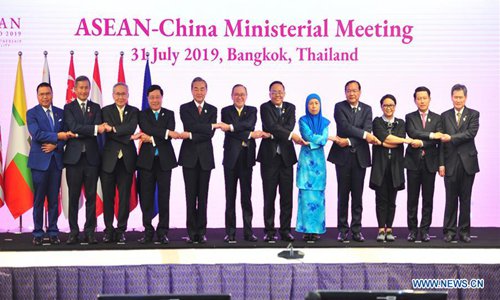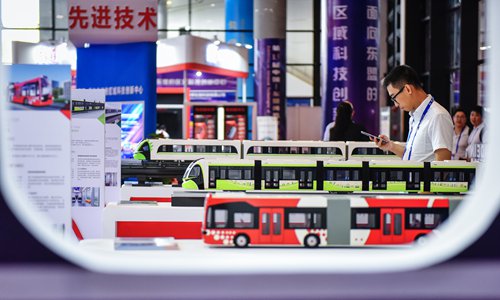HOME >> CHINA
China, ASEAN countries make progress on COC, vow broader cooperation
Source:Xinhua Published: 2019/8/3 23:26:50 Last Updated: 2019/8/4 10:01:22

Photo: Xinhua
China and the Association of Southeast Asian Nations (ASEAN) countries have made crucial progress in talks on a widely-anticipated Code of Conduct (COC), which demonstrates relevant countries' joint determination and efforts in formulating regional rules and safeguarding peace and prosperity in the South China Sea.
MAJOR COC PROGRESS
After attending the China-ASEAN foreign ministers' meeting held here earlier this week, Chinese State Councilor and Foreign Minister Wang Yi said China and ASEAN countries have finished the first reading of Single Draft Negotiating Text of the COC ahead of schedule.
"It marks new, major progress in the COC consultations and an important step toward the goal of concluding the consultations within three years," Wang said, attributing to the early completion of the reading to the "sincerity and resolve of all parties."
In a joint communique issued at the meeting, ASEAN foreign ministers said they welcome the efforts and progress made by the bloc members and China in negotiations on the COC in the South China Sea.
The completion of the first reading came as another milestone for the COC negotiations, which, launched in 2013, was designed to hammer out what will be an upgraded and strengthened version of the Declaration on the Conduct of Parties in the South China Sea (DOC) signed by China and ASEAN countries in 2002.
The COC talks have been speeding up in recent years. China and ASEAN countries approved its framework in August 2017 and arrived at the single draft negotiating text in August 2018. China proposed in November that the COC consultations be finalized in three years, gaining warm responses from ASEAN countries.
According to the official schedule, a second and then third reading of the negotiating text will be expected before the final conclusion. There have been signs from the foreign ministers' meeting that the talks might be finished earlier than the proposed three-year timeline.
"The negotiation is going quite well, and they need to maintain the momentum and the conductive environment," Joseph Matthews, senior professor at the BELTEI International University in Phnom Penh, said. "The swift conclusion of a meaningful COC will contribute to trust-building, peace and stability in the region."

Photo: Xinhua
MORE COOPERATION
According to Wang, the COC will help make the situation in the South China Sea more stable, enable countries concerned to more effectively manage and control disputes, and facilitate the cooperation among multiple sides.
The freedom of navigation and overflight will be further safeguarded, and the legitimate rights and interests of non-regional countries will also be better protected, he said.
With enough mutual trust and effective control of disputes, China and other relevant countries can strengthen maritime cooperation, including scientific investigations, crackdowns on maritime crimes and search and rescue operations, Wu Shicun, president of China's National Institute for South China Sea Studies, said, referring to the COC in the pipeline as a "roadmap" for deepening cooperation.
"China and ASEAN countries are focusing on practical areas that will build up mutual confidence and expand maritime cooperation, such as preservation and protection of maritime environment," said Kavi Chongkittavorn, senior fellow of the Institute of Security and International Studies at Bangkok-based Chulalongkorn University.
China-ASEAN security cooperation is also expected to make concrete progress.
China and ASEAN countries have successfully held maritime exercises twice and are actively talking on the institutionalization of maritime exercises and meetings between defense ministers.
"The joint exercises between China and various ASEAN countries should prioritize areas such as anti-piracy and counter terrorism, to which a lot of Southeast Asian countries, such as Malaysia and the Philippines, would pay importance," Oh Ei Sun, principal adviser of Malaysia's Pacific Research Center, said.
Foreign ministers of China and ASEAN countries also reached consensus in Bangkok to explore new areas of cooperation including e-commerce, scientific and technological innovation, 5G network and smart cities.
The China-ASEAN Young Leaders Scholarship was also launched, under which about 100 scholars from ASEAN countries will begin their study in China starting September.
PEACE UNINTERRUPTED BY OUTSIDERS
In a bid to undermine the efforts made by China and ASEAN countries on the settlement of the South China Sea issue, some outsiders are deliberately making waves in the region.
When meeting ASEAN foreign ministers, US Secretary of State Mike Pompeo again made irresponsible remarks on China's efforts in maintaining peace of the South China Sea.
In response, Wang said what "a certain non-regional great power" has done is not goodwill behavior nor responsible action that will address the regional countries' concerns of peace and development.
The United States is obviously making the South China Sea situation more alarming, said Nur Rachmat Yuliantoro, an international affairs expert from Department of International Relations at Gadjah Mada University in Indonesia.
Rommel Banlaoi, chairman of the Philippine Institute for Peace, Violence and Terrorism Research, also said the US role is in fact complicating the issue and has become the source of tension in the South China Sea.
Thanks to the China-ASEAN joint efforts, the South China Sea has become increasingly stable and secure. About 100,000 ships pass through the South China Sea every year, and none of them has ever been interrupted or impeded.
"So far, China and ASEAN countries have made steady progress in negotiating the COC, and we encourage all parties concerned to continue their peaceful negotiations for the sake of peace, stability and development in the region," Cambodian government spokesperson Phay Siphan said earlier this week.
The progress in the COC consultations and the stable situation in the South China Sea showed that China and ASEAN countries have the capability, wisdom and willingness to reach consensus and formulate regional rules, and any external interference should be excluded.
"Any interference from the third party or outsiders not only affects joint efforts made by China and ASEAN countries, but also sparks confrontations in the South China Sea," Siphan said.
(Xinhua reporters Mao Pengfei in Phnom Penh, Lin Hao in Kuala Lumpur, Liang Hui and Abu Hanifah in Jakarta, Wang Jin and Chen Jiabao in Bangkok contributed to the story.)
RELATED ARTICLES:
Posted in: DIPLOMACY